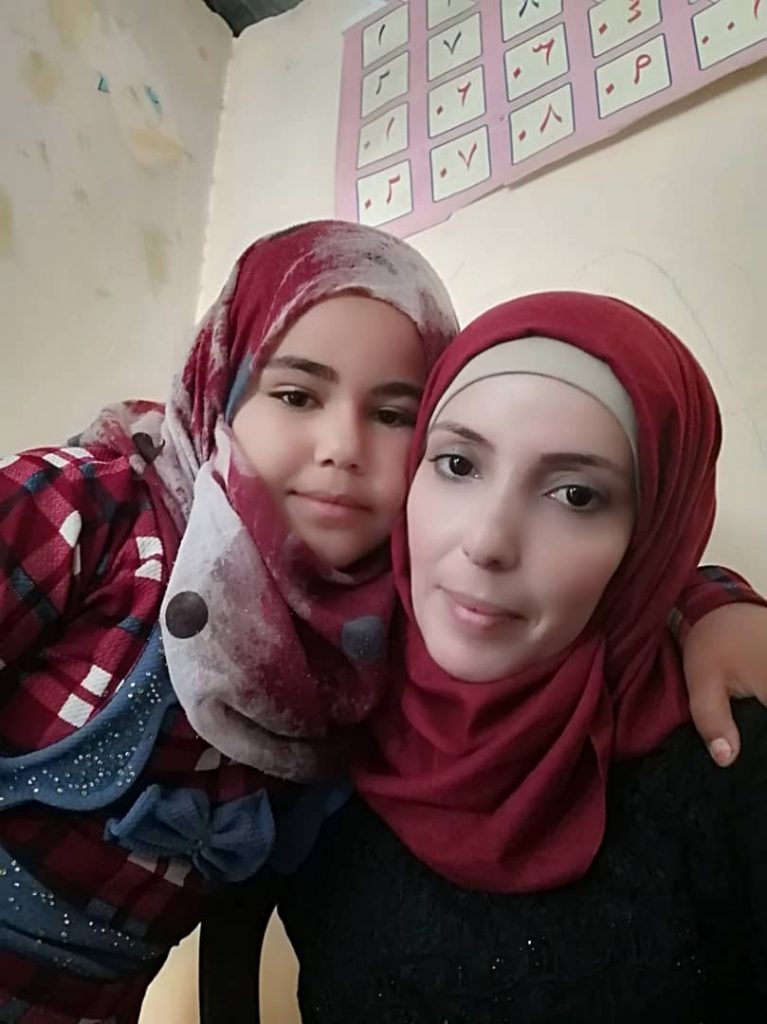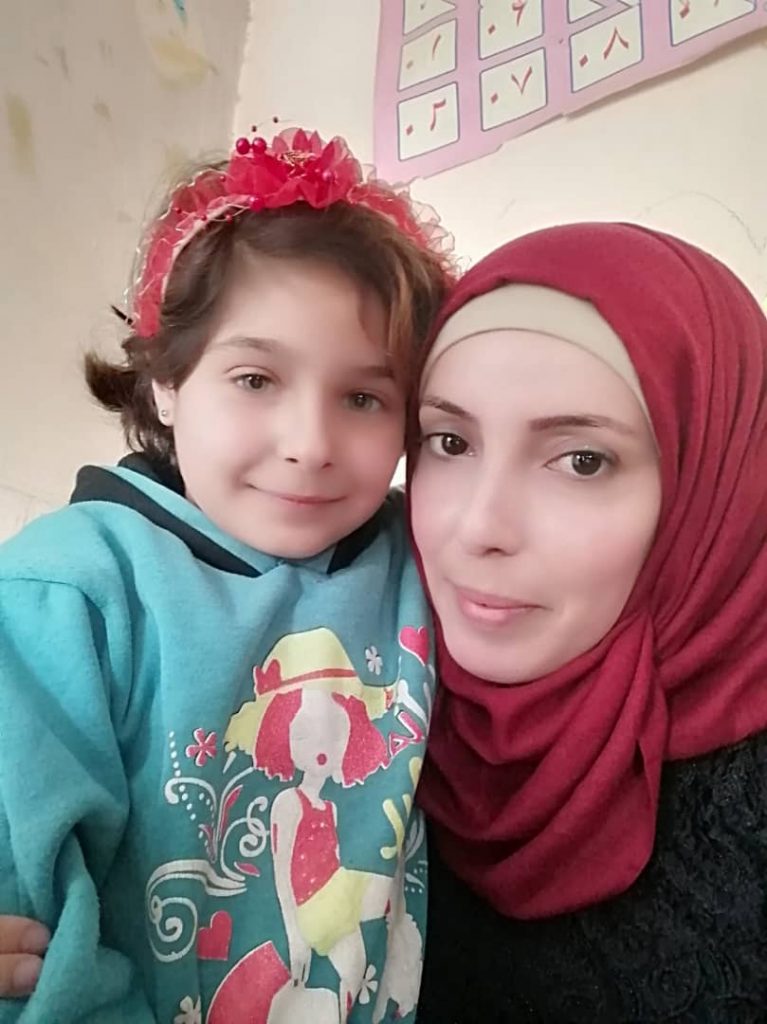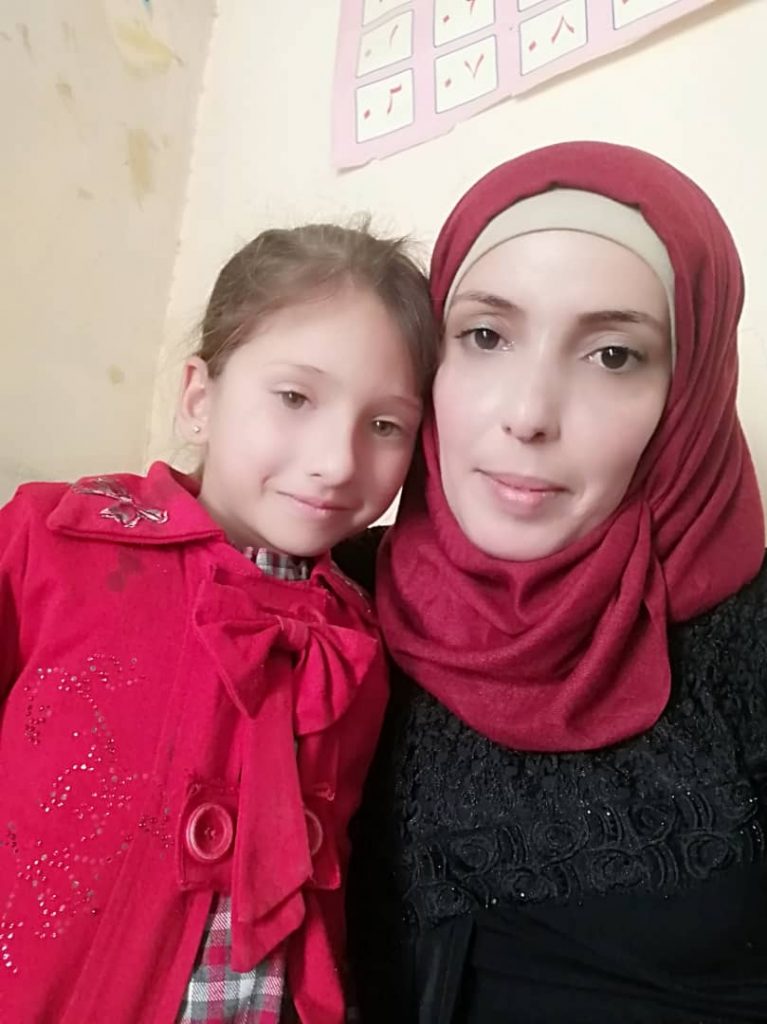This post is also available in:
![]() Français (French)
Français (French) ![]() Русский (Russian)
Русский (Russian)
By Natalia Yurevich
Ghaida Hussein’s inspiring story is a help to anyone going through difficulties in life. Ghaida is from Syria. She opened the first school for children in a Syrian displacement camp, and became involved in Women Leadership projects. Today, a mother of a three-year-old boy teaches classes to kids, provides psychological counselling to both children and adults, works with the international media, and inspires women everywhere to take up leadership roles. This conversation reminds us all of the impact a single life can make.
In the loving memory of Obaid Al-Hussein. May his memory be for a blessing.
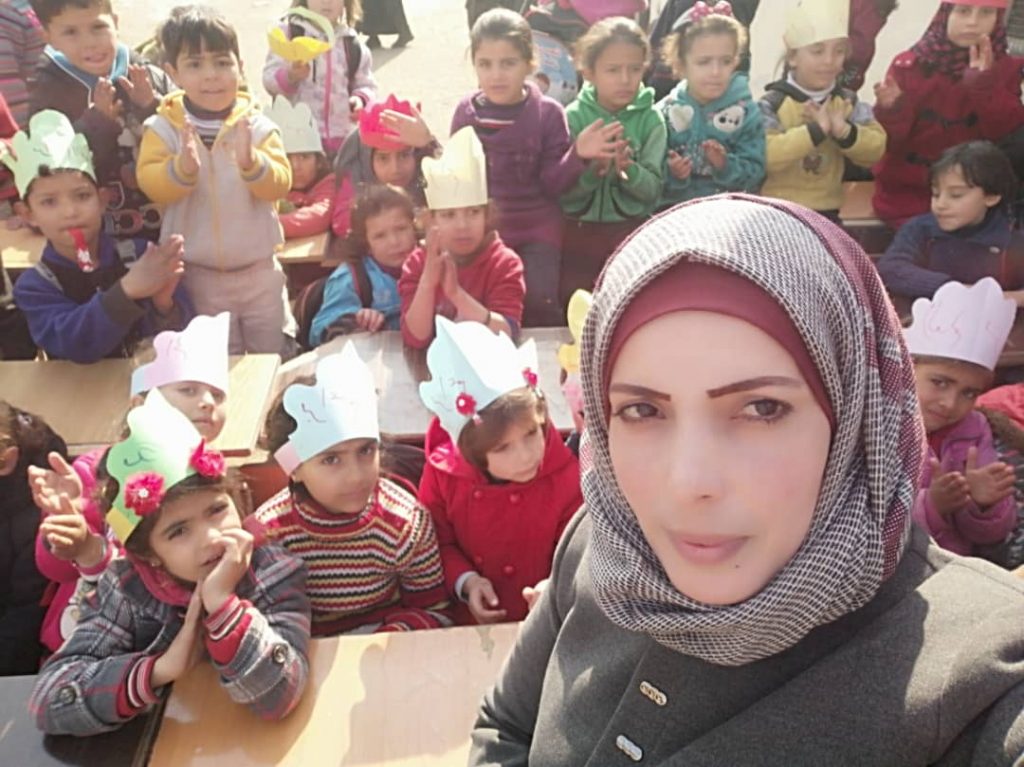
Ghaida welcome and I am delighted to speak with you today. If I asked you to teach me a word in Arabic that can help create connections with others, what would it be?
We have a wonderful phrase: “TBRINI!” The translation might shock you, though. It literally means: “Put me in the graveyard!”
You will hear people say it to each other a lot anywhere in the Arab world. But what they mean is: “I want to see me dead before you!” or, “I hope you’ll live longer than me!”
When you love someone a lot, your children, family, friends, say, “TBRINI!” to them.
So inspiring how generous you are with each other. Seven years ago, in 2013, you started a unique school project in a refugee camp in Syria. Why did you do this?
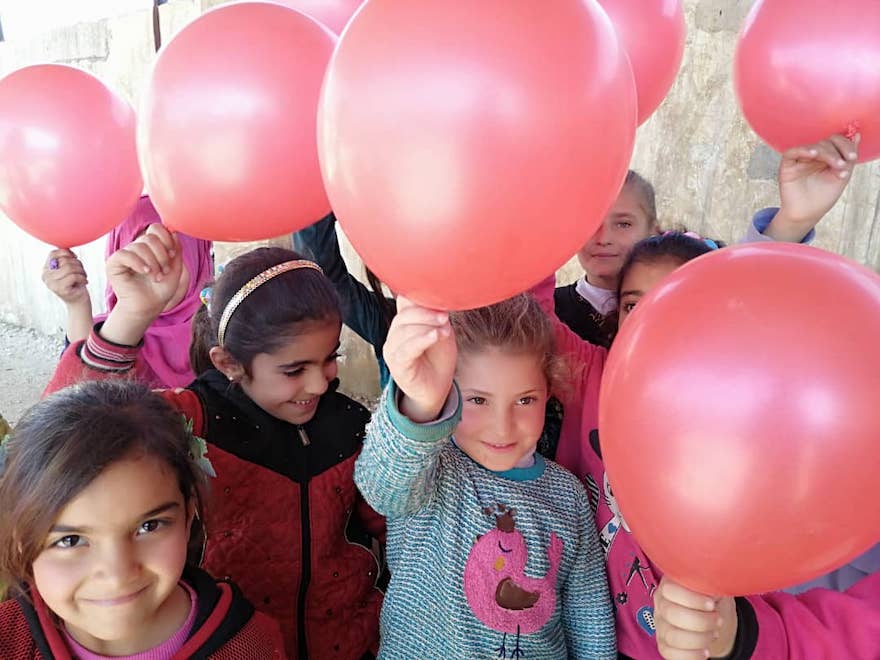
I started it for a simple reason: We needed it!
We lived in a big refugee camp, and I’d been watching school-age youngsters being outside, doing nothing for over two years!
I just knew what I had to do.
One day, I told the kids to come to my family tent and right then and there I started teaching them.
How many children showed up in your tent?
About forty between the ages of 6 to 13. But very quickly the number grew to 60!
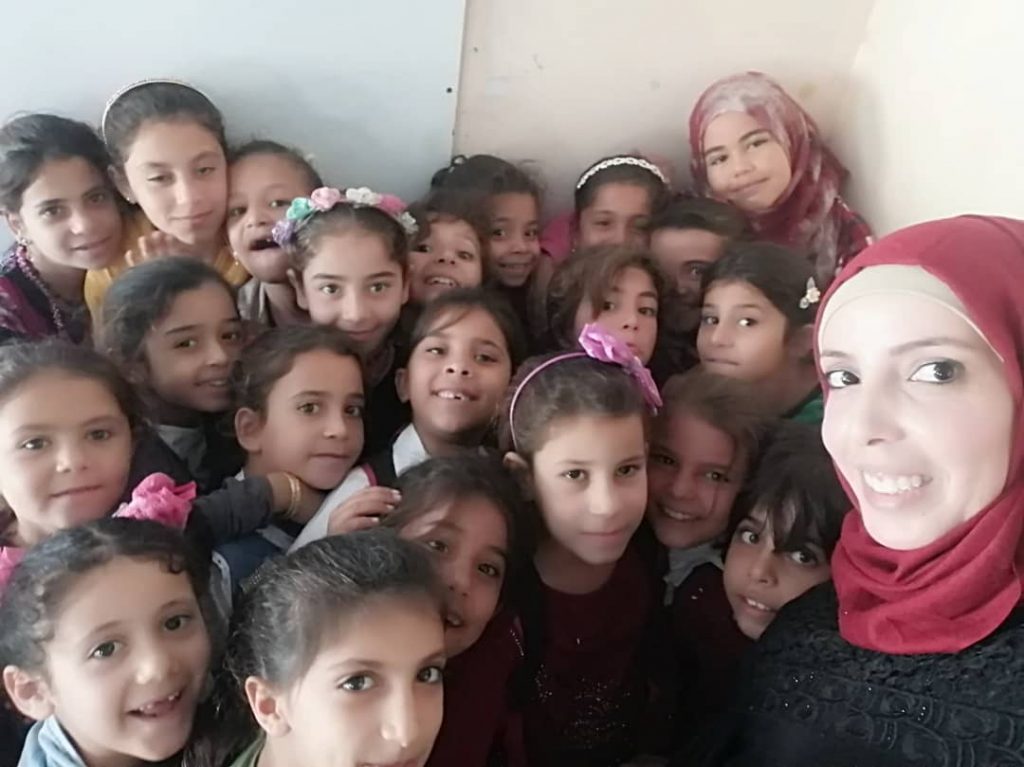
Wait, you, your family, and 40 to 60 students in the same tent?
Yes.
The first 40 were easy to accommodate. The tent was big enough, about 8 square meters. But sixty were just too many. I knew I had to ask for help. I went to the Camp Manager, and he offered us the use of a bigger tent for one day.
Unfortunately, my enthusiastic students were too loud, and we got kicked out.
Luckily, it was summertime, and the weather was warm, it was lovely. I decided that we would continue learning under the olive trees.
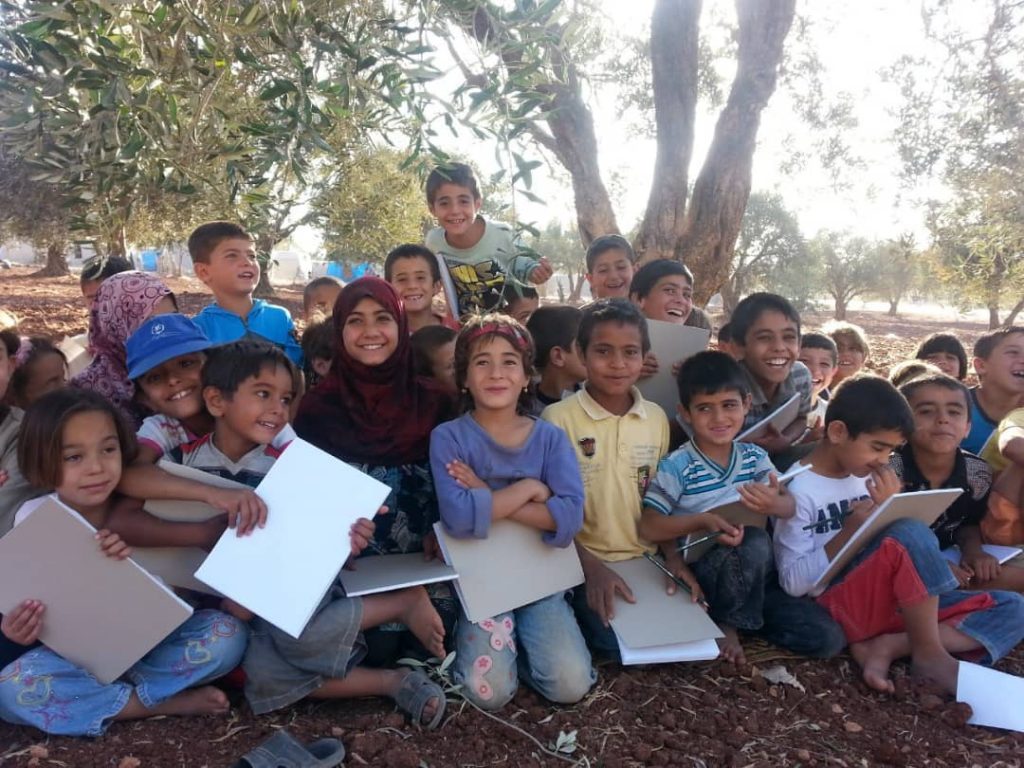
What was it like to teach in a school under the olive trees?
Imagine, every morning before the classes started, my students came running to my tent, gathered around it, waiting for me to come out!
It strongly reminded me of my childhood when my siblings and I would gather around the kitchen table, waiting for our mom to get our food ready.
Now it was my 60 students who were starving for knowledge and learning.
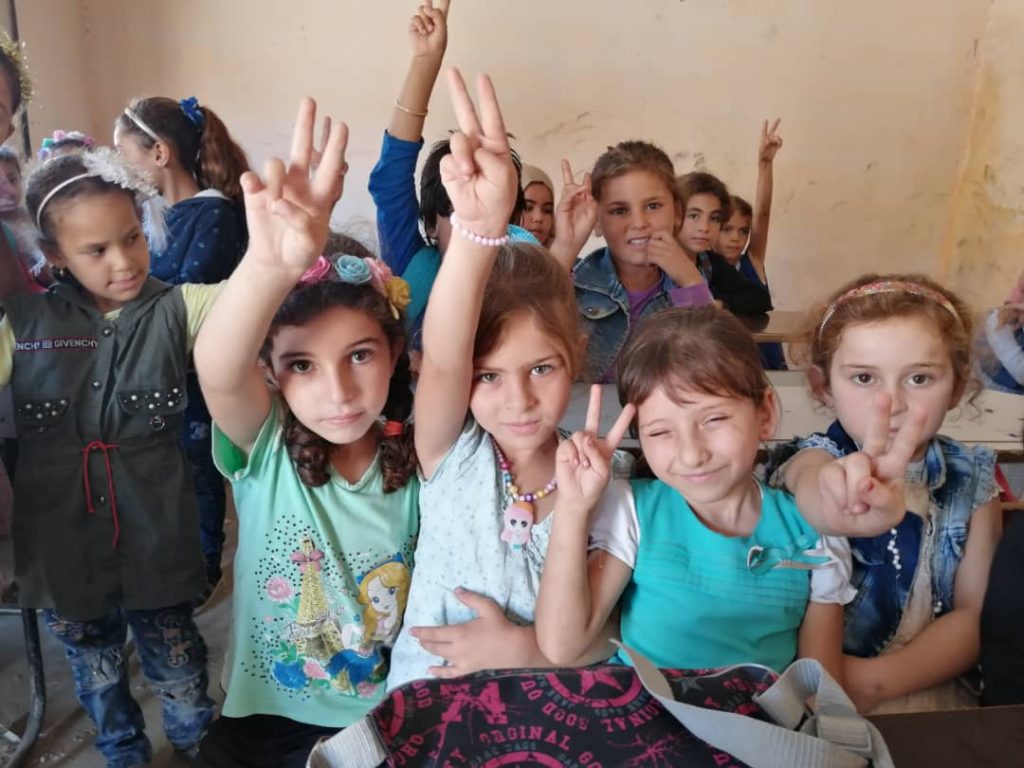
The schools in the Atmeh region are not big enough to accommodate all the refugee children.
It was really exceptional to start school in a camp. No-one had ever thought before that there was a need for it.
Imagine that!
How long did you teach under the tree?
Our Under The Tree school was opened the whole summer, about 3 or 4 months.
There were a few more displacement camps in the surrounding areas, and I knew it was essential to provide educational opportunities in those camps too.
I contacted my friends from other camps and asked if they wanted to start a school.
Yes, yes, yes and with the response offers from people who were willing to teach. Each camp would have a school for 50-60 students.
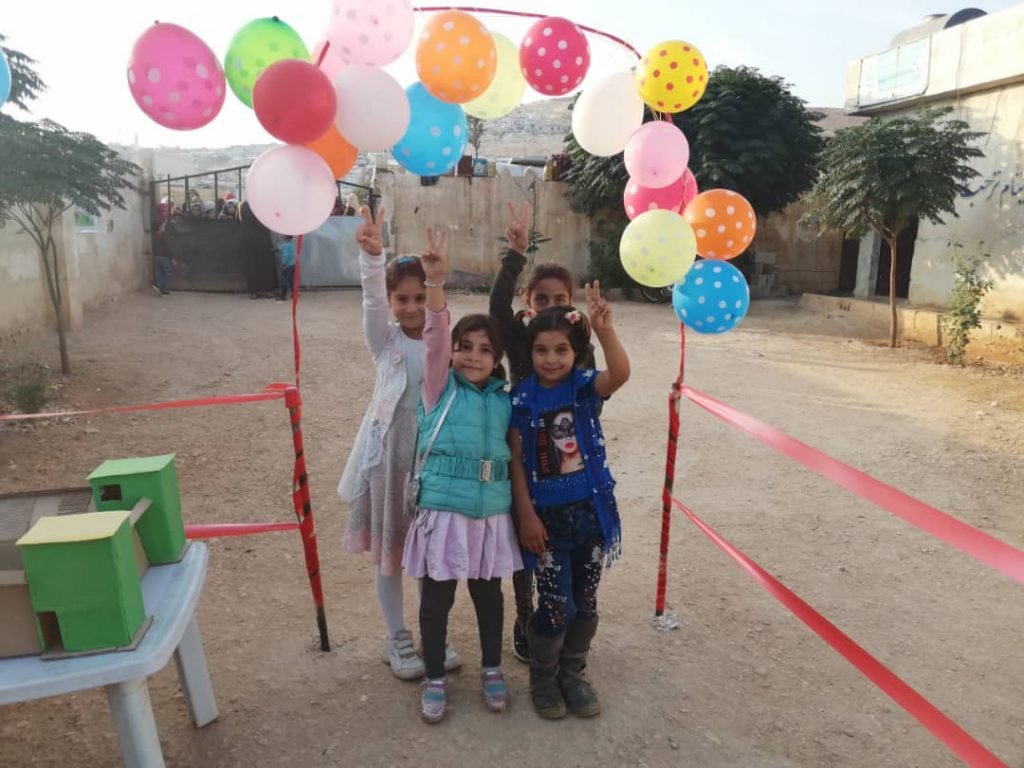
We started taking pictures and videos, sending them to NGOs that care about children and education. We wanted to show that we needed support for this project.
That was the right thing to do.
In 2013-2014, when we settled down in the camps, there weren’t any bombings, no displacements. It made prioritizing education a lot easier.
What happened when the summer was over?
We managed to get attention from different NGOs! They paid visits, distributed the chalk, boards, pens, and notebooks.
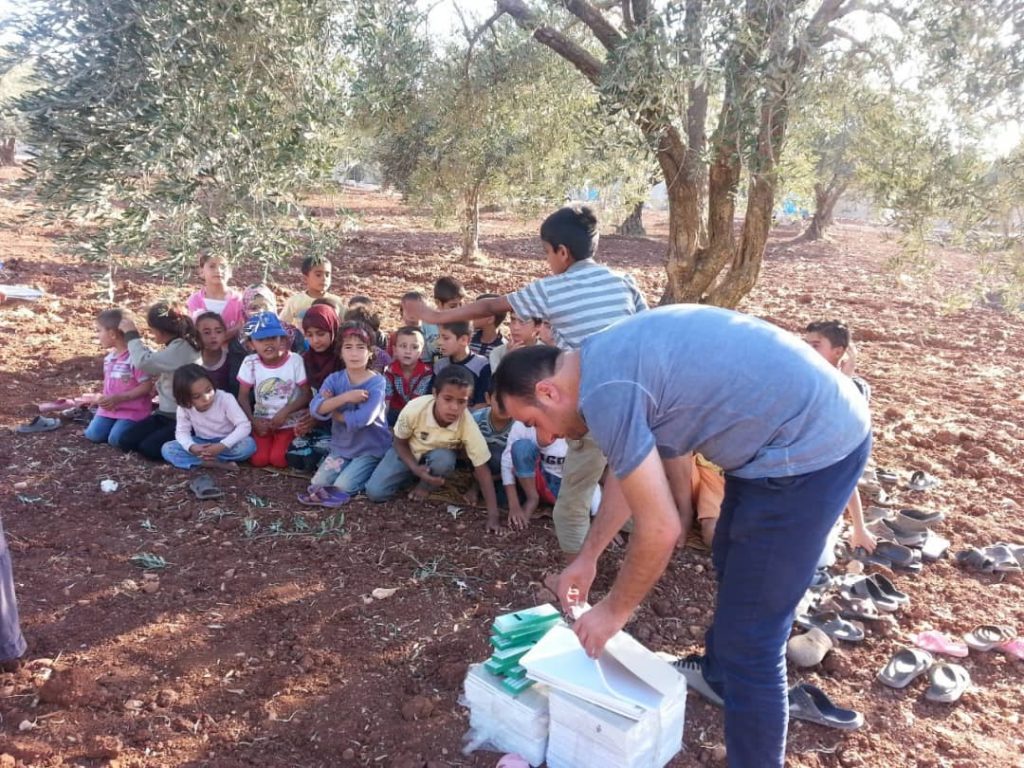
In 2014, the organization Save The Children helped us get bigger tents. A few years later, in 2017, with their help, we were able to open a bigger school with about 10 classrooms.
Today, our school can accommodate about 700 students from about five camps.
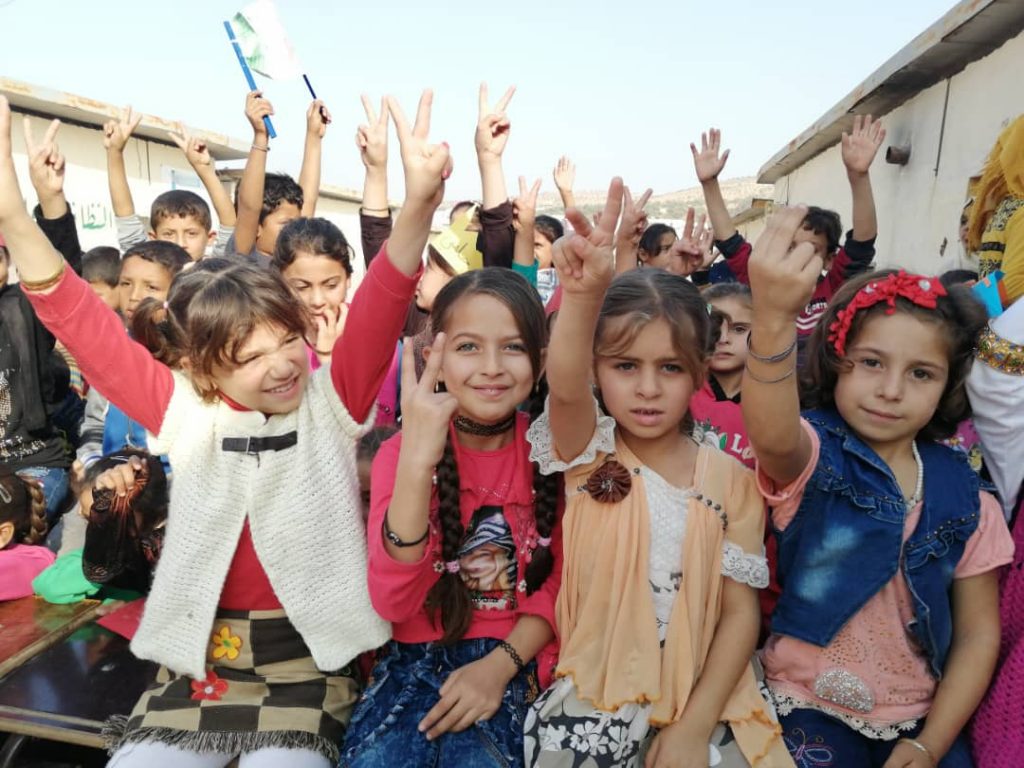
Thanks to Save the Children, we’ve added more teachers. We have a total number of 18 people working in the school and a male principal.
What classes do you teach?
I started with two things: reciting Koran and teaching to read and write. Many youngsters didn’t even know how to read or write, even though some were 13!
They’d been out of school for far too long.






Today, I work a lot with second graders. The classes may vary, depending on the needs.
We follow the regular curriculum. However, we make sure not to have pictures of Bashar al-Assad in the classrooms.
As the Corona virus started spreading to the Northwest of Syria this summer, we had to educate kids on how to protect themselves.
I’ve always been a teacher, but while in the camps I also became a psychological counsellor. I offer psychological support to students and adults.
Please tell me more about the psychological help you provide.
Many children saw loss and death. They saw their parents being detained or killed. They endured child labor.
Some lost their mother, and they couldn’t come to terms with it.
I had a little girl in my school who was hiding her father’s shoe in a bag. She believed her dad would come back, and when he returned, she would give him his shoe.
It was excruciating to witness because I knew that her dad was not coming back.
Adults endured a lot too.
Some mothers were detained. They would come to me to talk about it.
My role is to build trust with them, help them talk about their feelings. I help them understand their feelings and what they are going through.
It’s important to express feelings…and that is an essential part of what I do.
It’s tough to do the work you do and provide psychological support. Where do you find strength when you are down? What helps you?
God Bless, I have my family. As long as I have them, I feel safe, secure, and strong.
Having this strength always motivated me to support others. I always say to myself:
“I AM STRONG. I NEED TO USE MY STRENGTH TO HELP OTHERS.”
Ghaida Hussein
It might be like a cycle. I give, but I also receive a lot.
CHALLENGES
What challenges did you face during these years?
At the very beginning, many people were convinced that we didn’t need to open a school in a camp. People believed that the conflict would eventually stop, we would return home, and that would be the right moment to open a school.
Another challenge is finance. Until we started getting support from the NGOs, the whole project was challenging.
How did you convince those who thought it wasn’t the right moment to open a school?
I said,
“If we do not educate our younger generations, we will not be free. We started this revolution because we wanted a better life. We should demand what we want, demand our rights.”
IF OUR CHILDREN DON’T GO TO SCHOOL, THEY WILL BE UNEDUCATED. THAT’S PRECISELY WHAT THE REGIME WANTS.
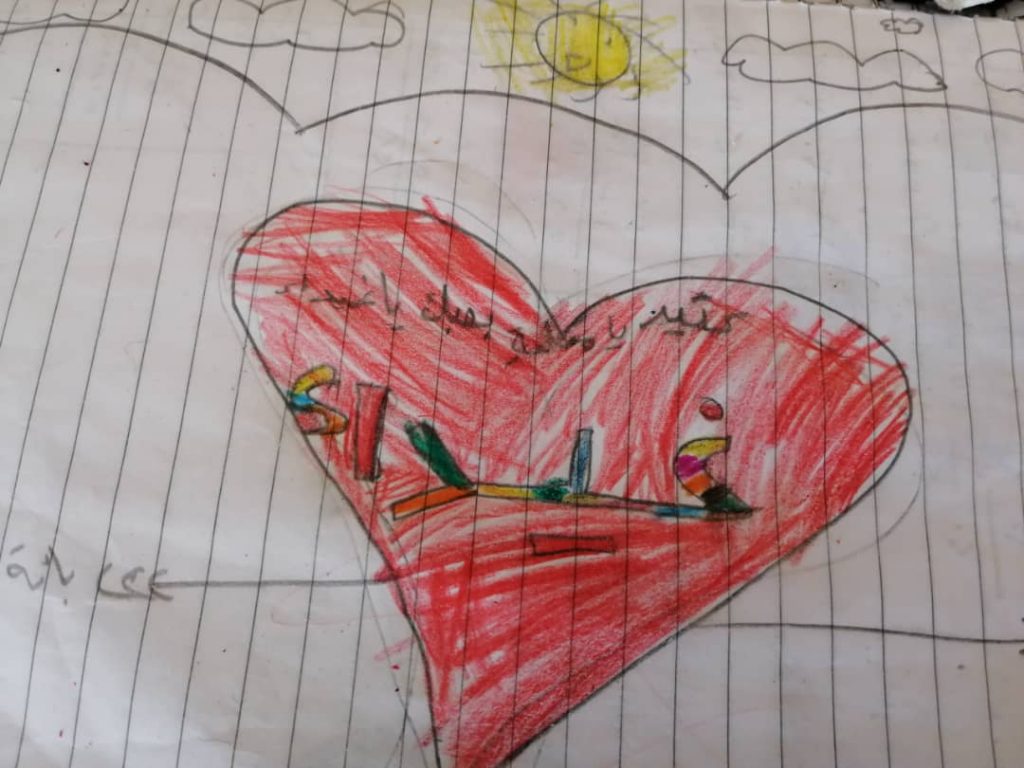
Is it difficult to be a woman in a refugee camp?
The worst thing for any woman is fearing for your children’s life. There’s always a possibility of bombings and shootings.
I fear for my three-year-old son.
When there were bombings, I wished I could become an umbrella. I covered my son with my body. I am so scared that he will be shot or injured by a split from an explosion.
I hope to protect him with my body.
TO LOSE HER CHILD IS THE WORST NIGHTMARE FOR ANY WOMAN IN THE CAMP.
INSPIRING FAMILY
Please tell me about your family.
I grew up in a big, loving, and well respected Syrian family. We are two boys and six girls in the family. I am the seventh out of eight siblings. We’ve always been very close to each other, and thanks to God, we are still together.
I’ve always felt supported, encouraged, and that’s very valuable. It gives me a lot of strength.
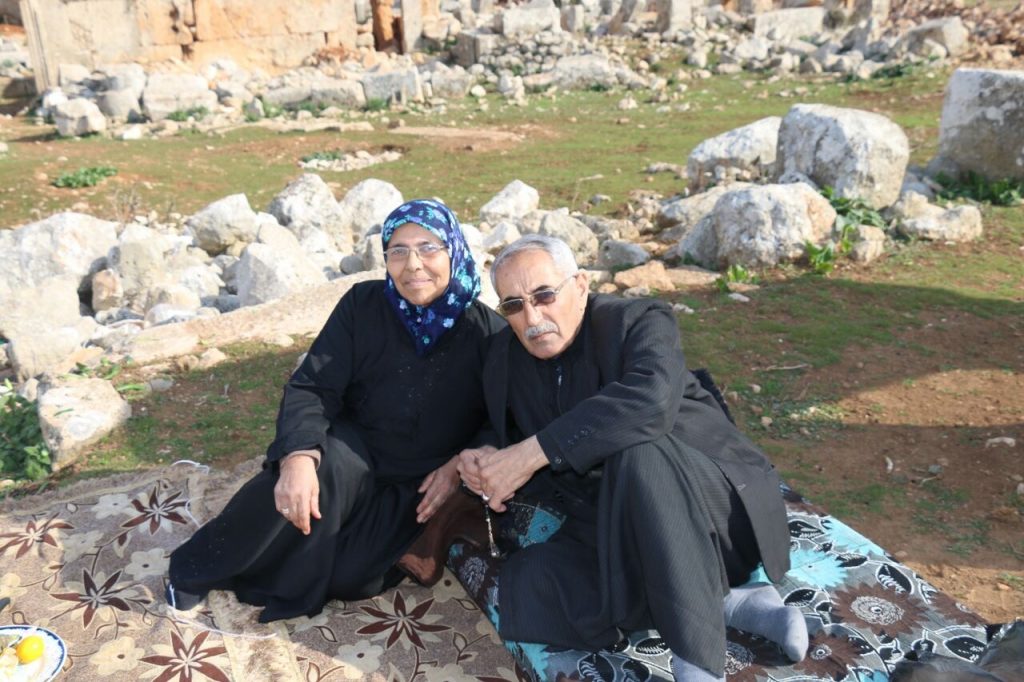
How did your life change after 2011?
Before 2011, my family was very well off. We owned a big house and a gas station.
In 2011, Syria’s political situation changed. After one of the attacks, we found our house and the gas station bombed, robbed, almost destroyed by the Regime army.
That was the last time I saw my house. We lost most of our possessions. We would move from one village to another, then we moved to live in a tent in a big camp, but we were grateful to be alive.
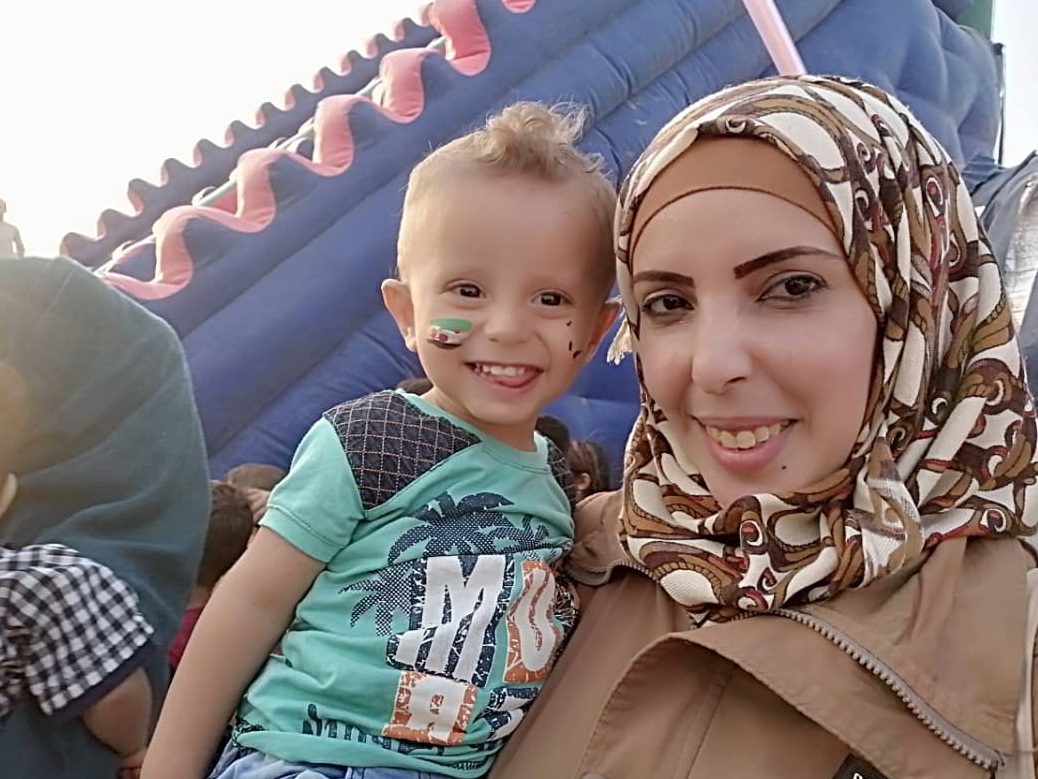
If you could give credit or thanks to one woman in your family or in your close environment, who would that be?
My grandmother.
She always told me beautiful stories.
In one of her stories, she described a magical place full of truly good humans. These humans do not envy each other. They care about each other and love each other.
The sky is perfectly blue in that place, with magnificent birds flying in the blue sky. It is a place of kindness, peace, and love.
Our reality during the revolution could not be more different. We could hardly see the sky without airplanes dropping bombs at us. People were scared, aggressive. The death felt omnipresent.
I would often think of the beautiful place from my grandmother’s story. I would say to God:
Please, God, show me the road to go to a better place, a place where people care about each other, a place of peace and love.
What’s your grandmother’s name?
Yazi.
Thank you for sharing with me the images of your drawings. Do you still draw today?
Art has always been my favorite subject.





I loved painting, but many of my pictures got stolen by the regime. I was sad that they were taken, but at the same moment, I told myself they got stolen, because they were beautiful. It means that someone liked them a lot.
I haven’t been able to do art in the camp. Right now, my main priority is education and children.
INSPIRING LEADERSHIP
Tastakel is an organisation to empower women in Syria. Why did you join it?
I’ll let Mai Barazi, our wonderful translator, tell about it first.
Thanks. Mai, please tell us more.
I had been following the founder of Tastakel, Hind Kabawat’s activities on Facebook for over 2 years.
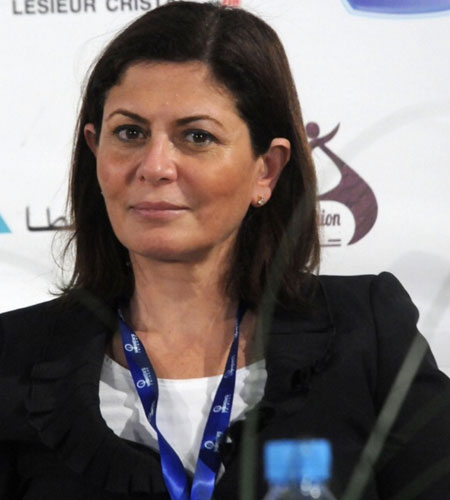
Hind Kabawat is Director of Interfaith Peace Building at George Mason University’s Center for World Religions and deputy head of the High Negotiations Committee (HNC) for Syria in Geneva. Hind has always supported women centres.
When I learned that she wanted to create a new organization with a goal to empower women in Syria, I contacted Hind and offered help. I was ready to do anything she asked.
We came up with the idea of teaching communication skills to women in Syria, to help them build a better society. I started teaching in Jarjanaz. But when Jarjanaz was bombed, we had to flee and close the center.
Then we started working with George Mason University. We created the curriculum to train women leaders in Syria. We give lectures on women’s rights, human rights, and conflict resolution. We teach Leadership and Communication skills that can help women have a more political and social presence in the future.
So Ghaida applied for this Program.
One of the criteria to be accepted for our Program is to be actively involved in community life. We do not offer jobs.
Our goal is to help women develop strong leadership skills and make a difference. Ghaida met all criteria.
Ghaida, please tell us why did you decide to apply?
I decided to apply as soon as I heard of Tastakel. I love learning, and I always try to develop my skills.
I profited a lot from the leadership courses, international law, learning about conflict resolution and peace building. These skills are precious to me because they help me to resolve conflicts encountered by women and children here in the camp.
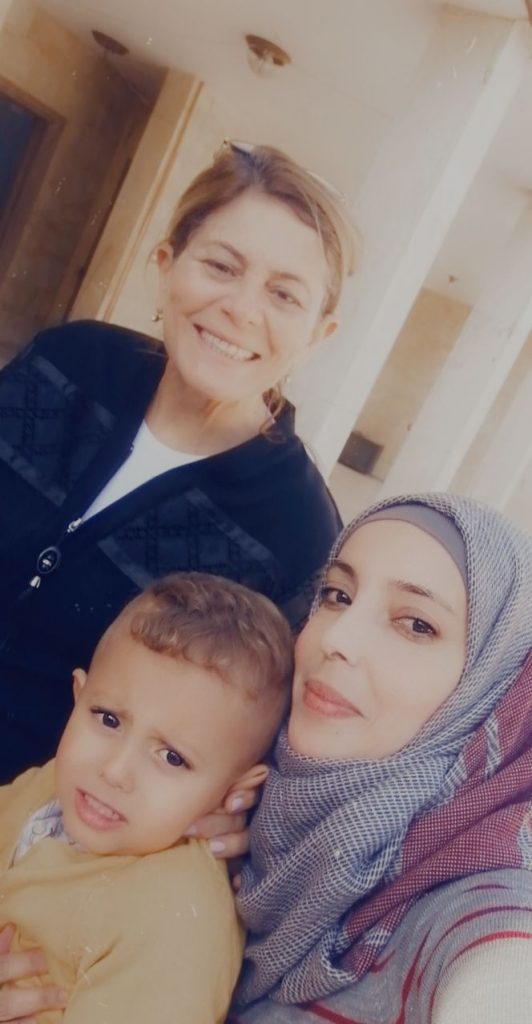
But I understood the importance of these skills much earlier.
At the beginning of the conflict, I witnessed how a woman with superb diplomatic skills could efficiently oppose blackmailing and bribes. Watching that woman inspired me to work on my communication skills.
I will not let anyone blackmail, exploit the teachers, or steal their wages.
Today I am teaching the Communication skills to other women. Together we can make the difference. I am really grateful for Hind’s project.
How can people help and support your projects?
What we need most is financial support.
In the middle of summer, because of the Corona virus, Save the Children and other organizations cut down the funds.
Our students do not have computers, but we are still providing classes online, using our students’ parents’ phones. Our teachers are volunteering today, but they need to be paid. They need to support their families. Right now, too many children and young people in Syria have very limited opportunities for schools.
The children of Syria have the right to education. They are the innocent victims of an unfair war. Education can illuminate our paths in the future.
How can anyone reading this interview today donate?
Due to international regulations, it is impossible to transfer money to a private person or organisation in Syria. I don’t have a bank account. However, you can make a difference today by donating to Save the Children. This organisation is one of the top-charity organisations, they supported our school, and they keep providing invaluable help to Syrian youth on the ground!
INSPIRING SUCCESS
Ghaida, what’s your definition of success?
Success for me is seeing children regularly coming to the classroom, knowing that they have an opportunity to attend the school I started.
People often think success is about money or achieving advanced degrees.
To me, success is about adjusting to new circumstances surrounding us and creating a better community life. Success is about being able to make a difference in people’s life.
Ghaida Hussein
I want to be the bridge for generations to walk upon, to connect generations, so that we can succeed in building a conscious and educated society dominated by love and peace.
Before we wrap up, is there anything else you would love to share with us? Perhaps, advice to our readers?
Resilience and hope are two of the most important things in life.
Before any success, we are likely to face multiple cases of failures, and it’s ok. It’s important to accept failures and learn from them. We should see failure as an experience and try not to feel down.
I’d love to recommend to develop resilience, accept that you can fail many times, try to learn from your failures, and never lose hope.
Thank you so much, Ghaida. Mai, thank you for your help. Tbrini!
Ibraho, tbrini!
Useful Links and Notes
❤️ Madame Success Fundraiser: HELP US CREATE MORE EDUCATION OPPORTUNITIES IN NORTHWEST SYRIA
☮️ Hind Kabawat
? Save the Children, a pertinent, non-profit humanitarian organization, providing immediate and long-term care and protection to Syria’s children. When you give, 86% of every dollar goes straight to our mission
